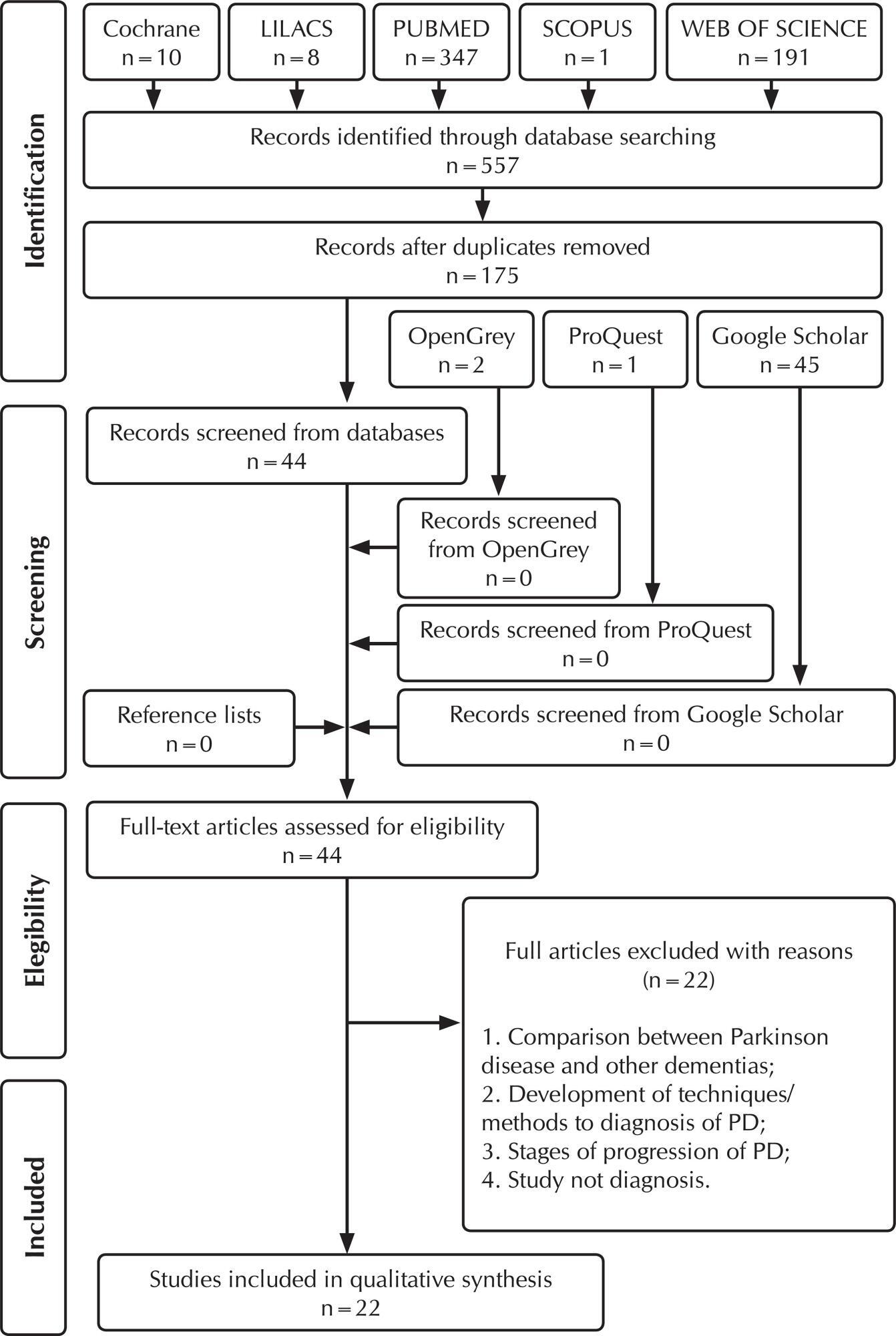-
ORIGINAL ARTICLE
King’s Parkinson’s Disease Pain Questionnaire: reliability and convergent construct validity
Revista Brasileira de Enfermagem. 2023;76(3):e20220379
08-07-2023
Resumo
ORIGINAL ARTICLEKing’s Parkinson’s Disease Pain Questionnaire: reliability and convergent construct validity
Revista Brasileira de Enfermagem. 2023;76(3):e20220379
08-07-2023DOI 10.1590/0034-7167-2022-0379
Visualizações0Ver maisABSTRACT
Objectives:
to assess the evidence of reliability and convergent construct validity of the King’s Parkinson’s Disease Pain Questionnaire.
Methods:
psychometric study of 75 older adults with Parkinson’s disease. The instrument was applied by two researchers separately and reapplied by one researcher 15 days later. In terms of reliability, internal consistency was assessed using the Cronbach’s alpha test and stability using the intraclass correlation coefficient. Scores of the King’s Parkinson’s Disease Pain Questionnaire were compared to those of the Geriatric Pain Measure in the assessment of construct validity.
Results:
the mean Cronbach’s alpha obtained between the three assessments was above 0.60, the intraclass correlation between the three assessments was above 0.90, and there was a weak but significant correlation between the two applied scales.
Conclusions:
the instrument showed adequate evidence of convergent construct validity and reliability, and can be used in clinical practice.
-
RESEARCH
The daily lives of people with Parkinson’s disease
Revista Brasileira de Enfermagem. 2018;71(2):272-279
01-01-2018
Resumo
RESEARCHThe daily lives of people with Parkinson’s disease
Revista Brasileira de Enfermagem. 2018;71(2):272-279
01-01-2018DOI 10.1590/0034-7167-2016-0577
Visualizações0Ver maisABSTRACT
Objective:
To understand the daily lives of people with Parkinson's disease.
Method:
Qualitative research, using as methodological and theoretical referential the Grounded Theory and Symbolic Interactionism, respectively. The in-depth interview was conducted with 30 people with Parkinson's disease.
Results:
From data analysis, three themes were selected: Living with the disease - living with the treatment and changes in lifestyle; Modifying of one's job performance - revealing incapacity for work and the need to anticipate retirement and; Living with the stigma - the feeling of prejudice against the disease and the perceived limitations of the health services.
Final considerations:
Living with a chronic and non-transferable disease encompasses social, physical and cultural effects, along with the personal experiences of each unique individual. This study assists the improvement of care to people with the disease, because the care practice emerges from the interactions between the subjects.
-
REVISÃO
Diagnostic validity of biomarkers in Parkinson’s Disease: systematic review and meta-analysis
Revista Brasileira de Enfermagem. 2018;71(6):3074-3083
01-01-2018
Resumo
REVISÃODiagnostic validity of biomarkers in Parkinson’s Disease: systematic review and meta-analysis
Revista Brasileira de Enfermagem. 2018;71(6):3074-3083
01-01-2018DOI 10.1590/0034-7167-2017-0822
Visualizações0Ver maisABSTRACT
Objective:
To identify biomarkers for Parkinson’s disease, cerebrospinal fluid, blood, saliva, and urine.
Method:
The studies were collected from the Cochrane, LILACS, PubMed, SCOPUS, WEB OF SCIENCE, OpenGrey, ProQuest and Google Scholar databases starting from May 3, 2016 and updated on March 20, 2017. Twenty-two studies were evaluated, by the Quality Assessment Tool for Diagnostic Accuracy Studies and Review Manager 5.3.
Results:
Evidence shows that serum antibodies can be used as highly specific and accurate biomarkers for the diagnosis of Parkinson’s disease at the outset. Biomarkers in the cerebrospinal fluid are related to increased motor severity, postural instability, gait abnormality, and cognitive impairment.
Conclusion:
Serum and cerebrospinal antibodies can be used as diagnostic biomarkers at the onset of the disease.

-
RESEARCH
Being caregiver of people with Parkinson’s Disease: experienced situations
Revista Brasileira de Enfermagem. 2018;71(suppl 6):2628-2634
01-01-2018
Resumo
RESEARCHBeing caregiver of people with Parkinson’s Disease: experienced situations
Revista Brasileira de Enfermagem. 2018;71(suppl 6):2628-2634
01-01-2018DOI 10.1590/0034-7167-2017-0008
Visualizações0Ver maisABSTRACT
Objective:
To understand the experience of caring for a person with Parkinson's Disease.
Method:
We used the qualitative study and thematic analysis with family caregivers of people with Parkinson's Disease.
Results:
Three thematic categories were identified, being: Feelings related to Parkinson's Disease; Changes in family daily routines; Caregiver strategies for self-care.
Final considerations:
Family care has shown the need for health services to provide caregivers support, as they experience situations of overload in care that can contribute to their illness. The findings also allow nurses to see the need for differentiated care for caregivers that, by assisting them with their needs, favor the quality of life of the caregiver, reduce the possibility of illness, allowing a more efficient care to the entity with chronic illness.



